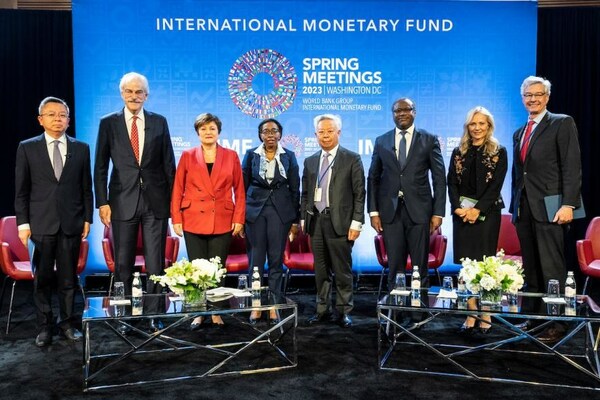WASHINGTON, April 12, 2023 /PRNewswire/ -- Panelists urged governments and private sector to join force to address climate crisis in a consistence manner on Monday in a high-level session coorganised by the International Finance Forum (IFF) as part of the International Monetary Fund/World Bank Spring Meetings in Washington D.C..

File photo of IMF: Kristalina Georgieva, Managing Director of the IMF (3rd from left) together with the panelists at the conference discussing "Scaling up Resilience and Sustainability Financing", organized by the IFF, the Bretton Woods Committee and the Paulson Institute in Washington DC on April 10.
The meeting, organised by the IFF along with Bretton Woods Committee, the Paulson Insititute, highlighted the urgency of climate action and the need to mobilise governments and private sector for sustainability financing.
Kristalina Georgieva, Managing Director of the IMF, opened by saying the IMF has loaned to five countries under the Resilience and Sustainability Trust (RST) with 44 countries interested in joining. The Trust was established last April to help countries build resilience to external shocks and ensure sustainable growth.
The panel discussion, with experts from public and private sectors, included Li Bo, Deputy Managing Director of the IMF, Jin Liqun, President of the Asian Infrastructure Investment Bank (AIIB), Uzziel Ndagijimana, Minister of Finance and Economic Planning of Rwanda, Deborah Lehr, Vice Chairperson of the Paulson Institute, Vera Songwe, Founder and Chair of Liquidity and Sustainability,and Kenneth Lay, Senior Managing Director of RockCreek Group.
The Resilience and Sustainability Trust was the first long term instrument of the IMF, said Li, which demonstrated the commitment of IMF member countries. But the available funds are insufficient to address climate issues.
"We need urgent action. We need unprecedented global cooperation," urged Li, before adding that the IMF will continue to push the RST so that Climate Change remains top priority for global leaders.
Jin Liqun of the AIIB expressed concerns over a lack of public awareness about the Climate Crisis and a sense of urgency by authorities to mobilise resources to deal with climate issues.
"Unless you do believe this (climate issues) is going to be a crisis looming large on the horizon, it is impossible to mobilize sufficient resources for that purpose," said Jin.
Ndagijimana said governments should equally prioritise climate crisis vis-a-vis Covid 19, with "immediate actions and continuous and consistent measures".
The panel also stressed the importance of collaborations between public and private sectors, Multilateral Development Banks and bilateral donors in climate financing.
Li of the IMF thinks good policy environments and incentives are essential to crowd in the private sector in climate financing. Moreover, the international community should also work together with low and middle income countries to build these countries' capacity in public finance, public investment management and financial management.
Ken Lay of RockCreek suggested that risks in climate projects are holding private funds from pouring into climate financing.
Jin pointed out that regulators should improve policy and regulatory environment to reassure private investors.
Songwe sees carbon pricing and carbon as the next commodity boom when international communities including MDBs work together to deliver data on carbon pricing and wealth will not only go to finance ministries but also local communities.












